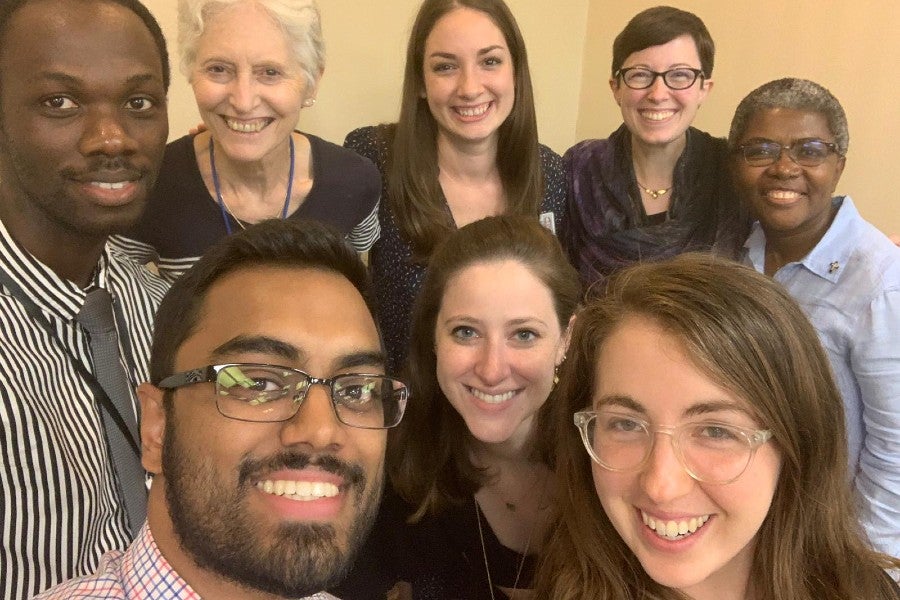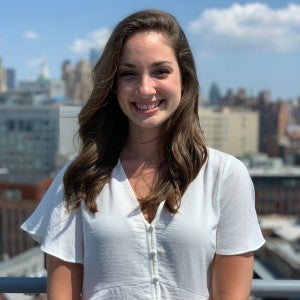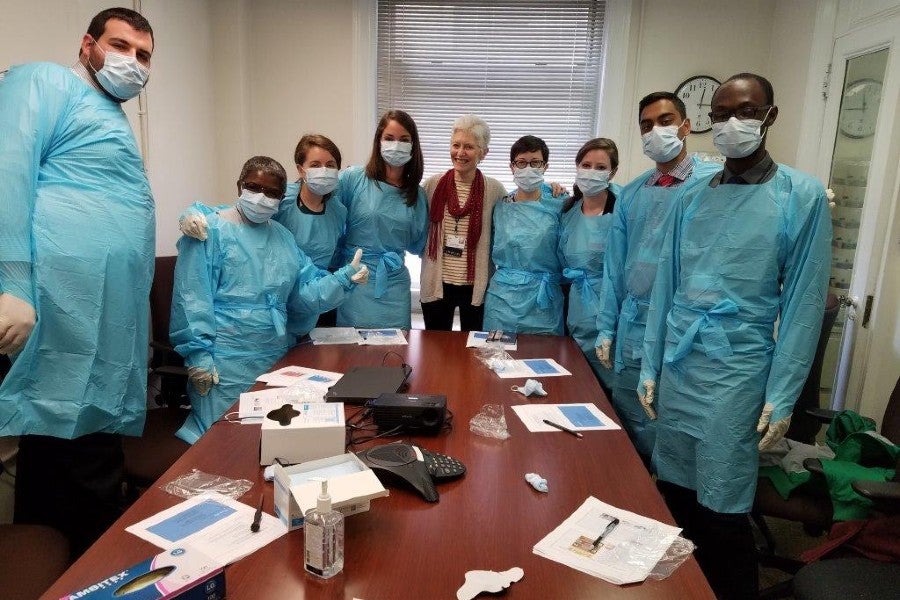Alumna graduates from Yale and heads to New York City for chaplain residency
Kayla Ford says, “Here am I. Send me,” to yearlong residency at Brooklyn Methodist Hospital
Janel Shoun-Smith | 615.966.7078 |

Kayla Ford ('17), (top row center) with her cohort of fellow intern chaplains at New York City's Lenox Hill Hospital in the summer of 2019.
Sometimes all God needs to ease pain is a listening ear.
Kayla Ford (’17), a Lipscomb honors graduate and a May 2020 Yale Divinity School graduate, headed this past summer to the U.S. city hardest hit by the coronavirus in spring 2020 to be that listening ear.

Kayla Ford ('17)
When Ford accepted a spot in New York City Presbyterian Brooklyn Methodist Hospital’s residency chaplain program in February 2020, COVID-19 was something still limited to TV news reports on China’s efforts to stop it. She was still working toward her Master of Divinity from Yale and was planning to move to New York City immediately after graduation.
She could not foresee at that time that New York City would become the first epicenter of a virus that is continuing to change Americans’ daily lives. That New York residents would spend 78 days in total lockdown and still be emerging to face economic, racial and health care challenges that summer.
Like many 2020 graduates, she was facing a completely different job market and practice setting than she expected, but she is facing those challenges in a city that saw more than 229,000 COVID-19 cases and 22,982 deaths (a death toll larger than all but eight countries) as of July 28, when she was preparing to move to the city.
Unlike many of her fellow graduates, Ford did not see her post-graduate placement cancelled, and now she re-located to NYC in August as planned. Even with only hundreds, rather than more than 10,000, COVID cases a day in the state, New York City was still in great need of spiritual comfort, she said.
Like the rest of the nation, New York City experienced a fall surge of cases, boosting per day new cases in the city to close to the same rate as the spring surge.
“It’s a job that is normally very emotionally exhausting. It is challenging personally and spiritually,” said Ford, who graduated from Lipscomb with a double major in English and philosophy.
“But this job is something I have been preparing for regardless of COVID-19. So when the pandemic happened, I knew that I had already signed up to do that hard job, so I might as well, because we will certainly need chaplains right now. It is a sad but true reality, at this point in time, that there is still a need for hospital chaplains.”
Ford sees the resident chaplaincy at Brooklyn Methodist as the perfect opportunity to not only bring comfort to people in crisis, but to also explore her particular interest in ministry: the theological questions inherent in human suffering.
Kayla Ford served as the chaplain for her social club, Phi Sigma, while studying at Lipscomb.
Ford grew up in Tennessee and Texas and came to Lipscomb to major in philosophy and intending to go to law school. But her classes in Bible, religion and literature, participation in mission trips and service as the chaplain of her social club Phi Sigma convinced her that divinity school would be a better path for her.
She was intellectually challenged by the questions posed in her philosophy of religion and Christian ethics classes and applied to graduate schools in hopes of exploring theological questions on what it means to be human and why people suffer.
“A lot of work in chaplaincy is listening to people’s stories and helping them to find meaning in their suffering,” she said. Likewise, her experiences on mission trips to Guatemala and to the Bronx, New York opened her “up to different types of suffering. I was drawn to the people,” she said.
“I got to know myself better throughout college and realized that I am more of a healer than an arguer. I am more naturally gifted to professions related to ministry and people.”
Yale Divinity School seemed like a good option for her continued studies as the divinity school dean, Gregory Sterling, is a member of a Church of Christ congregation, a New Testament scholar and a frequent attendee at Lipscomb’s annual Christian Scholars Conference.
At Yale she took courses in pastoral care, trauma, ethics and narrative care, a technique to bring meaning to people’s lives through the sharing and restructuring of their stories. She also took a course in a women’s prison, similar to Lipscomb’s LIFE program that she did not have an opportunity to participate in during her undergraduate years. In her second year of divinity school, she was accepted for a chaplaincy internship at Lenox Hill Hospital, also in New York City, for the summer of 2019.
Chaplains traditionally provide pastoral care, generally defined as social, emotional and spiritual support, to those in a secular setting, such as the military, prisons or hospitals.
People want to be heard and seen. They want to honor the suffering they are going through, so they just want to talk about it because sometimes the burden is too much to carry alone. — Kayla Ford
At Lenox Hill, Ford spent her summer visiting with patients and their families, sometimes at their request and sometimes as a friendly drop-by. Chaplains frequently attend to patients who may be nervous about a surgery or who just received upsetting test results as well as families grieving a loss, she said. At Brooklyn Methodist, chaplains are required to attend to the family at every in-hospital death, she said.
“Patients want listening,” Ford said. “People want to be heard and seen. They want to honor the suffering they are going through, so they just want to talk about it because sometimes the burden is too much to carry alone.”
Prayer is a common activity with patients and their families, she said. “There is something emotionally cathartic about hearing your struggles spoken out loud with another person.”
Physical touch is a powerful tool in these situations that Ford fears may be lost in many situations due to the COVID-19 pandemic. Currently, Brooklyn Methodist ministers to its COVID patients or their families through video-conferencing, Ford said.
“That is the big challenge COVID brings. How can we be present to people’s suffering without being present physically? How can you make them feel heard and seen, and not alone, when they are alone?”

While interning at Lenox Hill Hospital, Ford and the other chaplain interns had to learn to put on personal protective equipment to minister to contagious patients.
Ford has already had the experience of wearing personal protective equipment during her Lennox Hill internship to minister to contagious patients with the flu, pneumonia or C. diff and staph infections.
“Patients who had these conditions were some of my most thankful patients because of how much it meant for them to see someone. They were so, so lonely,” said Ford. “COVID poses real challenges to the way we do pastoral care. While I’m grateful for the ability to video-conference with patients, it isn’t quite the same. Regardless, I know God’s presence traverses time and space and transcends physical barriers.”
Ford has all the normal human fears of anyone walking into a health care environment during a pandemic. She worries, not so much for her own health, but that she may inadvertently pass the virus along to others. She also has all the normal fears of someone moving to live in the largest and densest city in the U.S. But she doesn’t plan to let those worries stop her.
“I know that I am doing important and meaningful work. I am happy to do it, because I know it is really needed,” Ford said.
“I remember (during my internship) having patients leave and my knowing they had had the opportunity to say something they had never said before or to have someone to hold their hand. You can tell when they have this moment of relief. I am always happy to provide relief. It is God doing the work and using me as a tool.”